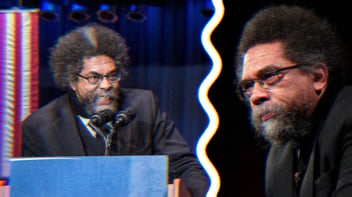Progressive Spotlight: Medea Benjamin.
No One Challenges Authority Like the CODEPINK Co-Founder.
 Image Description: Two photos of Medea Benjamin; One of her in front of a flowering hedge, another of her speaking at an event.
Image Description: Two photos of Medea Benjamin; One of her in front of a flowering hedge, another of her speaking at an event.
Since co-founding the group CODEPINK in 2002 to promote peace around the world and organize against U.S. military intervention abroad, Medea Benjamin has been on the frontlines of the global anti-war movement, often disrupting Congressional hearings, public events, and directly confronting powerful figures, including U.S. presidents.
Benjamin, who was born Susan but changed her name to Medea in honor of the Greek mythological figure, is among the most well-known peace-promoting figures in the United States. While she has gained notoriety for CODEPINK’s lively, made-for-broadcast protests, Benjamin has long been interested in challenging U.S. hegemony and uplifting human rights, whether at home or abroad.
With a background in public health and economics, Benjamin spent years working in Latin America and Africa, seeing firsthand the impact of U.S. intervention. She’s been a vocal critic of American policy in Latin America and has called for a modern-day version of FDR’s “good neighbor policy.” From providing direct training to brutal military and police forces and the establishment of foreign military bases to influencing elections and engaging in economic warfare, the U.S. has been a uniquely destabilizing force, argues Benjamin. “A new Latin America policy would not only counter racism but would uplift the region’s exceptional cultural richness,” reads a piece she co-wrote earlier this year about the region.
While her time abroad has served as a major influence, it was the disastrous war on terror—a conflict waged by four consecutive presidents—that turned Benjamin into something of a household name.
Benjamin and Jodie Evans founded CODEPINK in response to America’s response to 9/11, organizing countless demonstrations, vigils, sit-ins, hunger strikes, direct confrontations, and disruptions of government hearings.
Benjamin famously interrupted President Obama during one of his memorable speeches about drone warfare on May 23, 2013, in which he declared “America is at a crossroads.” By “America,” Obama was referring to the country’s military-industrial complex, which had suddenly embraced drones as the future of warfare. Famously secret about the use of these deadly sky-stalking weapons, Obama admitted that the U.S. “has taken lethal, targeted action against al Qaeda and its associated forces, including with remotely piloted aircraft commonly referred to as drones.”
Cool under pressure, Benjamin called on the president to close Guantanamo Bay—among his promises as a presidential candidate—and referred to the 106 detainees engaging in a hunger strike to protest the horrendous conditions and their indefinite imprisonment. A clearly agitated Obama directed Benjamin to “sit down” so he could tell her “exactly what I’m going to do.” Of course, Obama failed to close the notorious prison during his tenure.
Speaking to Democracy Now! the next day, Benjamin explained why she repeatedly interrupted Obama’s speech:
“I did it because I feel that he needs to be pushed more, that it has been over four years now of policies that have been killing innocent people with drones. It has been now over 11 years that innocent people are still being held in Guantánamo and now being force-fed. These are crisis situations, and it requires more from us as citizens.”
The tense back-and-forth is effectively memorialized in the official White House transcript from the event. Benjamin, identified only as “audience member” also took the president to task for giving the CIA the freedom to deploy drones and for the tragic civilian death count as a result of his policies.
It’s worth taking a look at a portion of the exchange:
Audience Member: How about Abdulmutallab — locking up a 16-year-old — is that the way we treat a 16-year old? (Inaudible) — can you take the drones out of the hands of the CIA? Can you stop the signature strikes killing people on the basis of suspicious activities?
The President: We’re addressing that, ma’am.
Audience Member: — thousands of Muslims that got killed — will you compensate the innocent families — that will make us safer here at home. I love my country. I love (inaudible) —
The President: I think that — and I’m going off script, as you might expect here. (Laughter and applause.) The voice of that woman is worth paying attention to. (Applause.) Obviously, I do not agree with much of what she said, and obviously she wasn’t listening to me in much of what I said. But these are tough issues, and the suggestion that we can gloss over them is wrong.
Benjamin and CODEPINK have made such forms of demonstration an art form. In 2015, the group attempted a citizens’ arrest of former Secretary of State Henry Kissinger for the horrific bombings in Vietnam, Cambodia, and Laos, among other noted atrocities and anti-democratic actions.
“Henry Kissinger is responsible for the deaths of millions. He’s a murderer, a liar, a crook, and a thug, and should be tried at the Hague,” Benjamin said after the attempted arrest.
You can always count on Benjamin to tell the truth about America’s most powerful figures—and she’s not afraid to say it to their face.
Image Source
- Medea Benjamin, CC BY-SA 3.0, via Wikimedia Commons. Changes were made.
- Ben Schumin, CC BY-SA 2.5, via Wikimedia Commons. Changes were made
- CODEPINK Logo: codepink.org.
Rashed Mian is the managing editor of the award-winning News Beat podcast and co-founder of the newly launched Free The Press (FTP) Substack newsletter. Throughout his career, he has reported on a wide range of issues, with a particular focus on civil liberties, systemic injustice and U.S. hegemony. You can find Rashed on X @rashedmian and on Bluesky @rashedmian.bsky.social.


